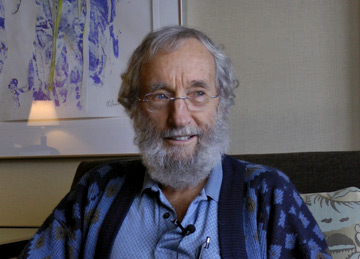Donovan

Cares for his wife
Age at interview: 77
Age at start of caregiving: 60
Donovan (77 years old) is married and has no children. He cares for his wife (67 years old) who needs 24/7 care. Donovan worked as a human resources manager in a large organization and retired in 1990. Donovan’s wife was diagnosed with multiple sclerosis (MS) in 1981 when she was 37 years old. Donovan became more actively involved in her caregiving in 1994 when his wife started using a wheelchair. Currently she needs 24/7 physical care, which is provided by Donovan and two live-in caregivers.
Donovan has been taking care of his wife for 17 years. Donovan feels that his wife is a patient and kind person who never complains. She was diagnosed with MS when she was 37 years old. She continued working until she was 44 years old and had to start using a wheelchair about 6 years later. At that point Donovan became her caregiver. Her disease progressed over time, and, at the moment, she is only able to move her right hand and her head. A few years after she started using her wheelchair, they decided to move away from the small island where they had lived since she left work, and Donovan started his retirement.
Once he started providing 24/7 care for her, he realized that he was under a lot of stress and was running out of steam. This is when they first hired someone to help with the physical care for 3 days/week. Later they hired a person who helped them 5 days/week, and when she left, they had to make a choice between a care facility or live-in caregivers. They opted for the latter, as they would not be able to choose the care facility themselves and this was hard for Donovan to accept. They have had help from two live-in caregivers for the last year; he had hoped that these would become more like family given that other caregivers had described that type of development. However, the two live-in caregivers complete their duties in the house and then retreat to their own rooms with their computer and phones. He struggles to find the right balance in managing and living with the caregivers, and finds it difficult to supervise them even though he was once a human resources manager for a big department in his professional life.
Donovan is trying to deal with the isolation, depression, and lack of energy that result from his caregiving activities. He feels a strong need to be in contact with other people and to be free to leave the house. He has made several attempts to improve his situation: finding help with counsellors; visiting support groups; arranging the live-in caregivers; going to fitness; taking a holiday—and he still searches for other social events that can take him out of the isolation and depression. However he has not yet felt that these things have really helped him. He knows that he needs private counselling, as his depression and tiredness are worsening, but he is not able to afford this.
He describes how he is nearing the end of his life and how he feels restless and frustrated by his situation. He speaks very openly and honestly about the fact that thoughts of killing himself cross his mind, just out of his desire to get out of the situation, even though he knows he would never do it.
More content
- When care changes over time – DonovanAt one point, Donovan felt his wife needed a wheelchair for her own safety, but she just wasn’t ready yet.
- The Future and caregiving – DonovanDonovan does not see a bright future, and sometimes has suicidal thoughts as a way to escape his situation as a caregiver.
- Resources – DonovanDonovan stopped going to the local caregivers support group as he felt the other caregivers were in different situations.
- Hospitals and facilities – DonovanDonovan and his wife considered all kinds of options, including a facility. In the end, they decided to continue living at home with the help of live-in caregivers.
- Home care and live-in caregivers – DonovanAlthough Donovan was an experienced supervisor in his professional life, he finds it difficult to supervise the two live-in caregivers.
- Financial impact – DonovanThanks to the CSIL program in BC, Donovan’s wife can continue to live at home with live-in caregivers.
- Caring for yourself – DonovanEven though he feels he needs to socialize, Donovan has trouble finding the time.
- Advice for other caregivers – DonovanAlthough Donovan has been hearing the same advice for years, he still has difficulty looking after himself.